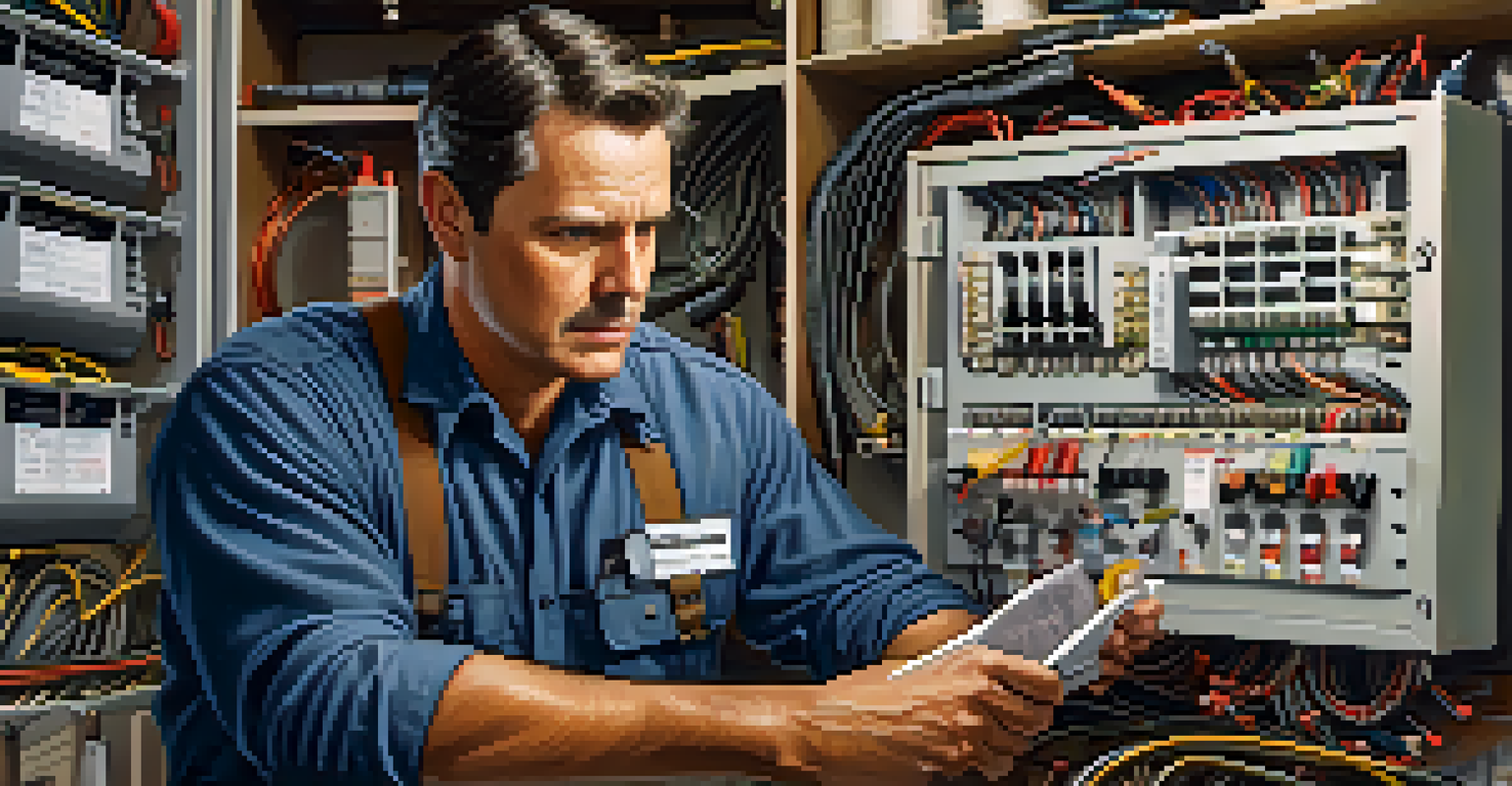How to Prepare for a Home Inspection as a New Homeowner

Understand What a Home Inspection Entails
A home inspection is a comprehensive examination of your property's condition, covering everything from the roof to the foundation. It's essential for new homeowners to grasp what this process involves, as it can identify potential issues that may need addressing. Typically, a licensed inspector will evaluate structural elements, systems, and safety features to ensure your home is in good shape.
An ounce of prevention is worth a pound of cure.
For example, they might check the plumbing for leaks or the electrical system for safety hazards. Understanding this process can help you prepare for what to expect and alleviate any anxiety leading up to the inspection day. Knowing the inspector's checklist can also guide you in addressing any potential concerns before they become costly repairs.
Ultimately, being informed about the scope of a home inspection will empower you as a homeowner and enable you to make more educated decisions regarding your property.
Get Your Home Ready: Declutter and Clean
Before the inspection, one of the best things you can do is declutter and clean your home. A tidy space not only makes a good impression but also allows the inspector to access crucial areas like the attic, basement, and crawl spaces. Remove any items blocking access to systems that need to be inspected, such as your furnace or electrical panel.

Think of it like preparing for a family visit; you want to present your home in the best light possible. This cleanup can also help you identify any minor repairs you might have overlooked, such as fixing leaky faucets or replacing burnt-out light bulbs. Plus, a clean home helps to create a welcoming atmosphere, which can ease the inspection process.
Understand Home Inspection Basics
Grasping what a home inspection entails will empower you to address potential issues and make informed decisions about your property.
In short, spending a little time tidying up can lead to a smoother inspection and can help you feel more confident about your home's condition.
Address Minor Repairs Before the Inspection
Taking care of minor repairs before the inspection can save you from potential red flags that might arise during the process. Simple fixes like patching up holes in walls, tightening loose doorknobs, or replacing worn-out weather stripping can make a big difference. These small tasks show that you are a responsible homeowner and take pride in your property.
The bitterness of poor quality remains long after the sweetness of low price is forgotten.
For instance, if squeaky floorboards have bothered you, now is the time to address them. Not only will this improve your home’s overall presentation, but it may also prevent the inspector from noting these issues, which could lead to more significant concerns later on. By proactively handling these repairs, you demonstrate diligence and care for your home.
In doing so, you’ll likely receive a better inspection report, and it can even help in negotiations if you decide to sell in the future.
Ensure All Systems Are Functional
Before the inspection, it’s crucial to ensure that all your home’s systems are in working order. This includes the heating, cooling, plumbing, and electrical systems. You don’t want any surprises on inspection day that could raise concerns for the inspector or potential buyers.
For example, make sure your heating system is running smoothly by testing it in advance. If you find any issues, consider having a professional take a look before the inspection. Addressing any malfunctions ahead of time not only helps the inspection go more smoothly, but it also contributes to your peace of mind.
Prepare Your Home for Inspection
Decluttering and completing minor repairs before the inspection can enhance the process and potentially improve the inspection report.
By ensuring that everything is functioning properly, you’ll present a well-maintained home that reflects positively on you as a new homeowner.
Provide Access to Key Areas
It's essential to provide clear access to all areas of your home, especially those that inspectors need to evaluate thoroughly. This includes attics, basements, crawl spaces, and even garages. If these areas are cluttered or obstructed, it can hinder the inspector’s ability to do their job effectively.
Imagine trying to find a lost item in a packed closet; it takes time and can lead to frustration. Similarly, an inspector may miss critical issues if they can't access these spaces easily. So, take the time to clear pathways and ensure doors are unlocked for a smooth inspection process.
By facilitating easy access, you show that you respect the inspector's role and are committed to a transparent evaluation of your home.
Gather Important Documentation
Having all relevant documentation ready for the inspector can streamline the process and help clarify any questions they might have. This includes warranties, receipts for repairs, and information about recent upgrades or renovations. By providing this information upfront, you demonstrate your diligence as a homeowner.
Think of it as preparing for a job interview; having your resume and references on hand shows you are organized and prepared. Similarly, documentation can shed light on the work you've done and any maintenance that has been performed, reassuring the inspector about the home's condition.
Communicate and Be Ready for Outcomes
Open communication with the inspector and preparing for various inspection outcomes can lead to a smoother experience and better understanding of your home's condition.
Ultimately, being organized with paperwork can make a significant difference in how the inspection proceeds and how it’s perceived.
Communicate with the Inspector
Open communication with the inspector can foster a more positive experience for both parties. Feel free to ask questions about their process or express any concerns you might have about specific areas of your home. This dialogue can help you understand what to expect and clarify the inspector's findings.
Much like a conversation between friends, it’s beneficial to create a comfortable environment where both you and the inspector can discuss the home’s condition openly. This transparency can lead to a more thorough inspection, as the inspector will be more likely to address your specific concerns.

Ultimately, good communication can enhance your understanding of the inspection process and help you feel more confident in the results.
Prepare for Possible Outcomes
As a new homeowner, it’s important to prepare for various outcomes from the inspection. While you may hope for a flawless report, it’s wise to mentally prepare for the possibility of needing repairs or updates. Understanding that most homes have some issues can help you approach the inspection with a balanced perspective.
Consider it like going to a doctor for a check-up; you may not always receive the news you want. However, knowing ahead of time can help you take proactive measures to improve your home’s condition. Whether it's minor repairs or significant renovations, being prepared can help you budget and plan accordingly.
In the end, being ready for any outcome allows you to accept the inspector's findings with grace and take the necessary steps to maintain your home.